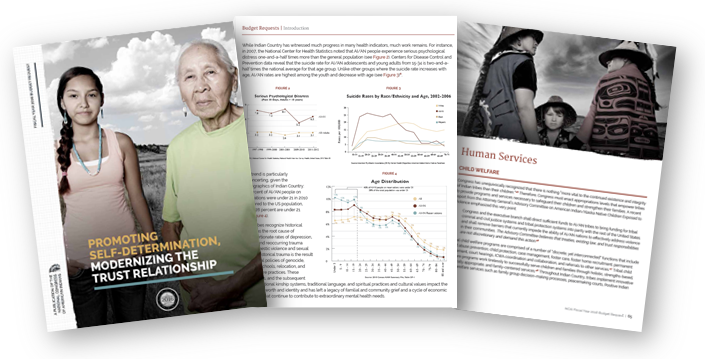FY 2016 Indian Country Budget Request
Promoting Self-Determination, Modernizing the Trust Relationship

The modern experiences of Native people reflect ongoing social and economic hardships due to a legacy of dispossession, attempted subjugation, and economic deprivation over centuries. Yet those hardships should not overshadow the successful resurgence of tribal sovereignty and self-determination – effective tribal control – in remedying the challenges that once seemed so insurmountable. Rebuilding nations and societies after generations of turmoil requires time, resources, and a commitment to the approaches that work. The approaches that work include respecting tribal self-determination and sovereignty, while honoring the promises made to Indian nations through the treaties negotiated and signed by our forebears.
The trust relationship in the 21st Century must maintain the nation-to-nation treaty obligations, such as the provision of education, public safety, health care and more, while promoting tribal capacity and governance. That relationship has evolved over time to one of recognition of the self-governance potential of Native peoples and governments, but it is also one that needs to be modernized to reflect the needs of Native people today. The federal government, in meeting its treaty and trust obligations, plays a key role in Indian Country. If Congress shrinks away from its commitments, the ensuing shortfalls lead to grave impacts to the harmony of tribal communities. But when the federal government honors its commitments based in the trust responsibility, while promoting tribal self-determination, Native people and leaders can solve long-standing social and economic dilemmas.
Many tribes recognize historical trauma as the root cause of disproportionate rates of depression, suicide, and reoccurring trauma from domestic violence and sexual assault. Historical trauma is the result of historical policies of genocide, boarding schools, relocation, and child welfare practices. These experiences, and the subsequent loss of traditional kinship systems, traditional language, spiritual practices and cultural values, impact the core of self-worth and identity, and has left a legacy of familial and community grief and a cycle of economic conditions that continue to contribute to extraordinary mental health needs. Reflecting a desire to address these issues, tribal leaders identified mental health as a top health concern for FY 2016 in tribal budget consultations.
Similar to the dynamics of tribal health status, the trends in economic characteristics throughout Indian Country offer cause for hope, even while many complex disparities remain to be addressed. Although some tribes have implemented strategies that enhance economic development for their communities to supplement federal sources, these efforts do not displace the federal government’s duty to fulfill its trust responsibility. The treaty and trust obligations to tribes contribute to the other regional economies as well in which tribes are major players. Ensuring tribal government capacity and promoting the creative and economic potential of the Indian self-determination era remains a key element for sustained economic growth among all tribes and regions.
Tribal leaders and administrators throughout Indian Country seek the same outcomes as other state and national leaders: to protect the health, safety, and prosperity of the people they serve. Tribal leaders are addressing urgent societal challenges, often with inadequate resources, but still facing expectations from their people for safe communities, educational opportunities, health care, clean air and water, and economic growth. Effective tribal governments that can meet the essential needs of their citizens require the fulfillment of the federal trust responsibility and respect for tribal self-determination.
This NCAI FY 2016 Budget Request offers recommendations for ways the federal government, partnering with tribes, should meet the educational needs of Indian youth; provide adequate health care via the Indian Health Service, for both direct and self-governance tribes; ensure responsible resource development for the future; provide safe and secure tribal communities; and supply the long-term investments in tribal public infrastructure and services required to ensure every American Indian and Alaska Native enjoys a decent quality of life and has an opportunity to succeed.
Download the entire FY 2016 document (PDF 2.99 MB) or individual sections below (PDF versions).
Table of Contents
Executive Summary (864 KB)
Introduction (558 KB)
Support for Tribal Governments (170 KB)
Public Safety & Justice (225 KB)
Homeland Security & Emergency Management (141 KB)
Education (240 KB)
Healthcare (367 KB)
Human Services (260 KB)
Economic & Workforce Development(232 KB)
Telecommunications (160 KB)
Agriculture & Rural Development (196 KB)
Environmental Protection (302 KB)
Natural Resources (199 KB)
Energy (161 KB)
Housing (143 KB)
Transportation (176 KB)
Historic & Cultural Preservation (245 KB)
Endnotes (78 KB)
Acknowledgements (48 KB)
Suggested Citation: National Congress of American Indians. (January 2015). Fiscal year 2016 Indian Country Budget Requests: Promoting Self-Determination, Modernizing the Trust Relationship. Washington, DC: Author.